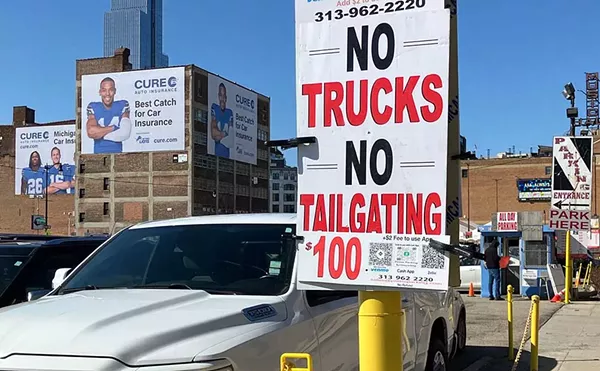They say that if there is a gun, someday it will shoot."
--Mikhail Gorbachev,
on why nuclear weapons
have to be abolished.
Well, the election is over, and we now have some relief from the torrent of lies and meaningless personal insults that seriously affected our ability to contemplate Ally McBeal's tight little skirts these past few weeks. Aren't you glad we settled all the major issues of the day, and can go back to flogging Bill over Monica?
That will come soon enough. Today, in a last-ditch attempt to try to lure readers back from Ask Isadora, I had intended to write a steamy little piece on the future of the Democrats. But I decided instead to take an annoying look at a real issue, one that we actually could do something about, despite conventional wisdom.
Matter of fact, if we don't, there is little doubt we will eventually be destroyed in an especially terrible way. We're talking about nuclear weapons, something nobody thinks much about these days, except when places like India or Pakistan occasionally behave like idiots. What most of us, sheeplike, think is that we don't have to worry anymore.
Actually, we are in more trouble than ever. Seven years after the bipolar world crumbled into dust, the world still has 35,000 nuclear warheads. Except conditions are rather more desperate in Russia, lots of crazies would love to buy, borrow or steal a nuclear weapon or two, and the things seem easier to come by all the time.
Now comes Jonathan Schell, long a respected journalist for the New Yorker, with a persuasive new book, The Gift of Time (Owl Books, paper, $12.95).
Sixteen years ago, Schell wrote The Fate of the Earth, which described better than anything else I've ever read what would happen if there ever were a nuclear war.
Today Schell, who came to Detroit last week for the annual Cranbrook Peace Lecture, says that it doesn't have to be this way. He convincingly argues that we have a temporary opportunity to actually abolish nuclear weapons, now.
For his new book, he interviewed leaders, arms experts and military men across the globe about whether and how this could be done. Not all of them agree; not all of them agree that total abolition is possible or even fully desirable. But The Gift of Time makes it crystal clear that the choice is likely to be the survival of our precious nukes, or ourselves.
What is different now from the first days of the nuclear era is not our peril, but that we seem oblivious to it. Once upon a time, we thought about the bomb a lot. Eight months after John Glenn first orbited the earth, much of the globe was very nearly incinerated over the Cuban missile crisis. Children like me practiced tucking themselves under their desks, as if that would have done any good.
Fortunately, the cowboys of '62 backed down. After that, cooler heads prevailed at the highest levels of both major crime syndicates. Capo Leo "Brows" Brezhnev and crosstown rival Don "Tricky" Dick Nixon knew they had everything to lose if the waterfront disappeared. So each side kept their nukes locked down, occasionally rattling them for show, and kept a tight watch on their more hotheaded small fry allies.
That meant we were all relatively safe, barring a computer malfunction, which as we all know, never ever happens. Unfortunately, nuclear disarmament was essentially impossible in the bipolar world, so we contented ourselves by eventually agreeing that we wouldn't build more than 20,000 or 30,000 fully armed nukes each.
The key to our safety was seen as something called, appropriately, MAD -- Mutual Assured Destruction. Fire one nuke and we fire 'em all; everybody dies; no winners. Each side tacitly accepted that, at least until Ronald Reagan's nutty "Star Wars" missile defense scheme which some feared would threaten the balance of terror.
Then, what everybody pretended to pray for and nobody expected, happened. The Soviets dissolved! Vanished, in a twinkling, leaving behind bewildered, hungry people -- and thousands of nukes they neither wanted, needed, could afford to maintain, or eat.
Wouldn't that have been the time for the United Nations -- for the world -- led by the United States to say, okay; now we can do it! Now we can eliminate these weapons forever, weapons so terrible they can never be used lest we destroy the world. The United States could have, should have, taken the lead. After all, we are the only nation ever to have used nuclear weapons on people, remember?
So far, we've done little or nothing. But now, Schell argues, we must. You may react with a snort, thinking this hopelessly naive, the politics of Pollyanna.
Even if we can buy off the Russkies, Pakistan and Israel and South Africa aren't going to beat their nukes into nuclear reactors because we say so, right?
No one expects it to be easy. Yet as the author sums it up, whether today's thousands of warheads are merely "monstrous leftover trash," or "the seeds of a virulent new nuclear era, in which nuclear weapons are held more widely and rooted more deeply, is not a matter for prediction; it is a matter for choice."
Tell that to the congressmen you just elected. They may be messy, but the warranty says they are trainable, and they are, after all, ours.






